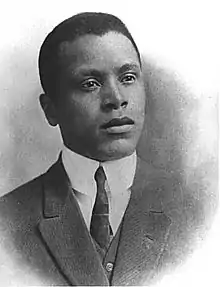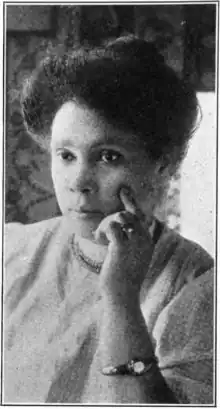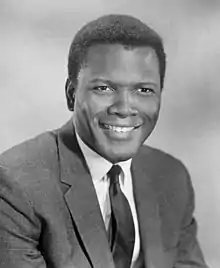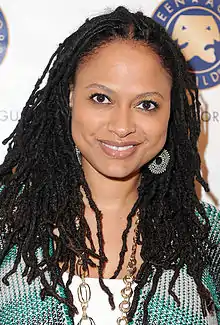African-Americans in film refers to the history, contributions, and representation of African-Americans in the film industry. This article covers the evolution of African-American roles in film, including notable filmmakers, actors, and films, as well as the challenges and achievements of African-Americans in the industry.
History
Early cinema

In the early days of cinema, African-American roles were scarce and often filled with stereotypes. Pioneers like Oscar Micheaux, one of the first significant African-American filmmakers, countered these narratives with films like The Homesteader (1919) and Body and Soul (1925), which were part of the "race film" genre and tackled issues such as racial violence, economic oppression, and discrimination[1] The Johnson Brothers and Spencer Williams.[2]

Other pioneers included Maria P. Williams, the first black female film producer, known for her 1923 film Flames of Wrath,[3] and Noble Johnson, who founded the Lincoln Motion Picture Company in 1916 to produce positive films starring black actors.[4] Spencer Williams, another prolific filmmaker, directed films like The Blood of Jesus (1941), which portrayed Southern Baptist religion through a black lens.[5] These filmmakers' contributions were pivotal in challenging and changing the stereotypical and discriminatory portrayal of African-Americans in early cinema.[6]
The Civil Rights era
The Civil Rights Movement profoundly impacted African-American representation in film, marking a shift from stereotypes to more varied and complex characters. During this era, "race films" began to combat the negative racist stereotypes prevalent since the early 1900s. A significant breakthrough came with Nothing But a Man (1963), the first full-feature Black drama featuring an all-Black cast aimed at a mixed audience, released as the Civil Rights Movement was gaining momentum.[7]

Sidney Poitier, a prominent figure of this era, broke barriers with his Oscar-winning performance in Lilies of the Field (1963), becoming the first Black man to win an Oscar.[8] He also starred in Guess Who's Coming to Dinner (1967), which featured the first interracial kiss in an American film, a significant moment reflecting the changing social norms following the Civil Rights Movement.[9]
This era marked the beginning of a transformative period in Hollywood, with Black creatives working tirelessly to combat harmful stereotypes and create a more inclusive and varied representation of the Black experience in film.[10]
Contemporary era
Significant achievements and diverse storytelling have marked the contemporary era in African-American cinema. Notably, films like Moonlight (2016)[11] and Black Panther (2018)[12] have gained critical acclaim and commercial success. Moonlight, an exploration of a young African-American man's journey, was the first LGBTQ+ film with an all-Black cast to win the Academy Award for Best Picture. This landmark victory highlighted the evolving recognition of diverse narratives within the African-American community.

Black Panther, the first Black Marvel superhero film, achieved box office success and significantly impacted cultural representation. The film's portrayal of African heritage and its strong, nuanced characters marked a departure from stereotypical roles and opened new avenues for representation in mainstream media. These films, along with other notable works in this era, have challenged traditional norms, paving the way for a more inclusive and representative cinematic landscape.[13]
Representation
The portrayal of African Americans in film has evolved into more nuanced representations, reflecting the varied experiences within the African-American community. Films have historically used Black narratives to challenge stereotypes and tell diverse stories, from the early "race movies" combatting Jim Crow stereotypes to the blaxploitation films of the post-civil rights era.[14] Despite Hollywood's historical tendency to caricature the Black experience, recent years have seen a shift toward a more authentic and varied portrayal of African-American lives.

This change is partly attributed to the increasing presence of Black actors and themes in mainstream cinema, although their representation in blockbuster movies remains limited. Studio executives have traditionally perceived films focusing on African-American themes as having a narrow appeal, impacting the investment in such movies. However, the growing popularity of directors like Spike Lee and Tyler Perry, who predominantly cast African-American actors, signifies a positive shift in Hollywood's approach to race.[15] The introduction of the first African American Disney princess, Tiana, in 2009 also marks a significant step towards breaking the color barrier in Hollywood.
While progress has been made, the journey towards post-racial Hollywood is ongoing, with the industry continuing to grapple with its long-standing racial issues. The increasing acknowledgment and success of films with African-American leads and themes reflect a growing recognition of the importance of diverse representation in cinema.[16]
Notable figures
Actors
Denzel Washington: Known for Training Day (2001)[17] and Malcolm X (1992). Viola Davis: Acclaimed for her performance in Fences (2016). Chadwick Boseman: Celebrated for his role in Black Panther (2018).
Directors
Spike Lee: Known for Do the Right Thing (1989).[18] Ava DuVernay: Director of Selma (2014).[19] Jordan Peele: Renowned for Get Out (2017).[20]
Producers
Oprah Winfrey: Produced several significant films.[21] Tyler Perry: Known for films centered on African-American experiences.[22]
Influence and impact
African-American cinema has profoundly shaped American cultural narratives, with films like Spike Lee's Do the Right Thing sparking national conversations on race relations[23] and Hidden Figures highlighting the stories of African-American women.[24] The industry has seen a shift towards diverse storytelling, exemplified by the success of Black Panther.[25] Films like Moonlight have not only illuminated the African-American LGBTQ+ experience but also signaled a shift in industry recognition with its Academy Award achievements.[26] [27] These developments have inspired a new generation of filmmakers and resonated globally, demonstrating the universal appeal and significance of African-American narratives.[28]
Challenges
Despite progress, African-American filmmakers face significant challenges, including systemic barriers in funding, distribution, and recognition within a predominantly white industry. Ongoing issues of stereotyping and typecasting restrict the range of roles available to African-American actors, often confining them to limited portrayals.[29] Additionally, the underrepresentation of African Americans in key roles behind the camera, such as directors and producers, limits the diversity of stories and perspectives in Hollywood. Economic challenges, like lower budgets and marketing resources for films with predominantly African-American themes, further impact their commercial success.[30] Nevertheless, the industry has witnessed initiatives aimed at increasing diversity and inclusivity, advocating for policy changes and improved representation in all filmmaking areas.[31]
See also
References
- ↑ VanEpps-Taylor, Betti Carol (1999). Oscar Micheaux: Dakota Homesteader, Author, Pioneer Film Maker: a Biography. Dakota West Books. ISBN 978-1-893250-03-1.
- ↑ "Oscar Micheaux (1884-1951)". Rotten Tomatoes. Retrieved 18 November 2023.
- ↑ "Maria P. Williams (1866-1932)". Rotten Tomatoes. Retrieved 18 November 2023.
- ↑ "Noble Johnson (1881-1978)". Rotten Tomatoes. Retrieved 18 November 2023.
- ↑ "Spencer Williams (1893-1969)". Rotten Tomatoes. Retrieved 18 November 2023.
- ↑ "Black Filmmaking Pioneers from the Earliest Days of Cinema". Rotten Tomatoes. Retrieved 18 November 2023.
- ↑ "Nothing But a Man". Stacker. Retrieved 18 November 2023.
- ↑ "Sidney Poitier wins an Oscar". Stacker. Retrieved 18 November 2023.
- ↑ "First interracial kiss on film in US". Stacker. Retrieved 18 November 2023.
- ↑ "History of Black Representation in Film". Stacker. Retrieved 18 November 2023.
- ↑ "'Moonlight' hits the scene". Stacker. Retrieved 18 November 2023.
- ↑ "'Black Panther'". Stacker. Retrieved 18 November 2023.
- ↑ "A History of Black Representation in Film". Stacker. Retrieved 18 November 2023.
- ↑ "A History of Black Representation in Film". Stacker. Retrieved 18 November 2023.
- ↑ "African-American representation in Hollywood". Wikipedia. Retrieved 18 November 2023.
- ↑ Manasan, Althea (2021-03-18). "From servants to outlaws: 100 years of Black representation in Hollywood films". CBC Radio. Retrieved 2023-11-18.
- ↑ Jr, Jeffrey Bowie (2022-12-26). "'Training Day's Alonzo Harris Was an Important Role for Black Actors". Collider. Retrieved 2023-11-18.
- ↑ "Spike Lee breaks down the explosive 'Do the Right Thing' scene between Mookie and Pino". EW.com. Retrieved 2023-11-18.
- ↑ "Scholars: 'Selma' Film Likely to Have Social Justice Impact". Diverse: Issues In Higher Education. 2015-01-08. Retrieved 2023-11-18.
- ↑ Ramos, Dino-Ray (2017-10-22). "'Get Out' Director Jordan Peele On Divisiveness, Black Identity & The "White Savior"". Deadline. Retrieved 2023-11-18.
- ↑ "Oprah Winfrey". www.oscars.org. 2014-09-15. Retrieved 2023-11-18.
- ↑ Pilkington, Ed (2009-04-02). "Meet America's first black movie mogul". The Guardian. Retrieved 2023-11-18.
- ↑ Khairy, Wael. "Wake Up!: Revisiting Spike Lee's Do the Right Thing Over 30 Years Later". rogerebert.com/. Retrieved 2023-11-23.
- ↑ Magazine, Smithsonian; Wei-Haas, Maya. "The True Story of "Hidden Figures," the Forgotten Women Who Helped Win the Space Race". Smithsonian Magazine. Retrieved 2023-11-23.
- ↑ "The Black Panther movies have effectively changed the worldview on Africa". International Relations Review. 2023-11-22. Retrieved 2023-11-23.
- ↑ "'Moonlight' illuminates a new vision of the black community". WHYY. Retrieved 2023-11-23.
- ↑ "2021 Hollywood Diversity Report: Audiences showed up for diverse films in theaters, online". UCLA. Retrieved 2023-11-23.
- ↑ Sharman, Russell (2020-05-18). "African Americans in Cinema". Retrieved 2023-11-18.
- ↑ "The 5 Most Common Black Stereotypes in TV and Film". ThoughtCo. Retrieved 2023-11-23.
- ↑ Cho, Winston (2023-07-14). "Hollywood Diversity Initiatives May Be Challenged After Supreme Court Affirmative Action Ruling". The Hollywood Reporter. Retrieved 2023-11-23.
- ↑ "Representation of Black talent in film and TV". www.mckinsey.com. Retrieved 2023-11-18.
